Educational Governance in Maldives: AVID College EDG 906 Report
VerifiedAdded on 2023/06/12
|12
|700
|269
Report
AI Summary
This report provides an overview of educational governance in the Maldives, highlighting the constitutional right to education and the legal accountabilities of educational institutions. It discusses the roles of various stakeholders, including teachers, students, parents, educationalists, and ministry officials. The report identifies challenges such as geographical isolation, lack of trained teachers, and limited technological infrastructure. Recommendations include developing teacher training programs and investing in technology. The report concludes by emphasizing the Ministry of Education's efforts to improve education quality through technology and the need for adequate teacher training. This assignment was completed for AVID College's EDG 906 Educational Governance course.
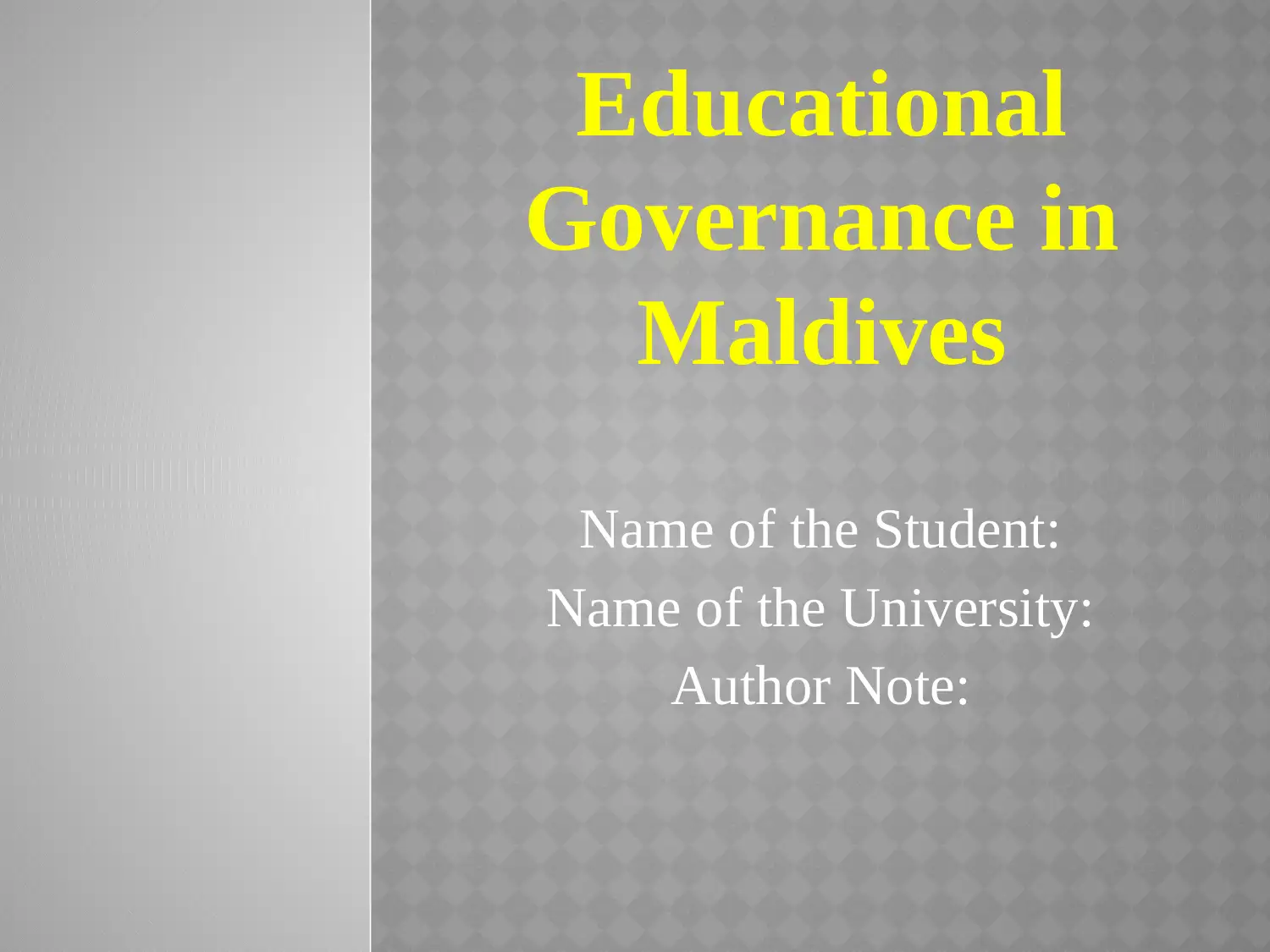
Educational
Governance in
Maldives
Name of the Student:
Name of the University:
Author Note:
Governance in
Maldives
Name of the Student:
Name of the University:
Author Note:
Paraphrase This Document
Need a fresh take? Get an instant paraphrase of this document with our AI Paraphraser
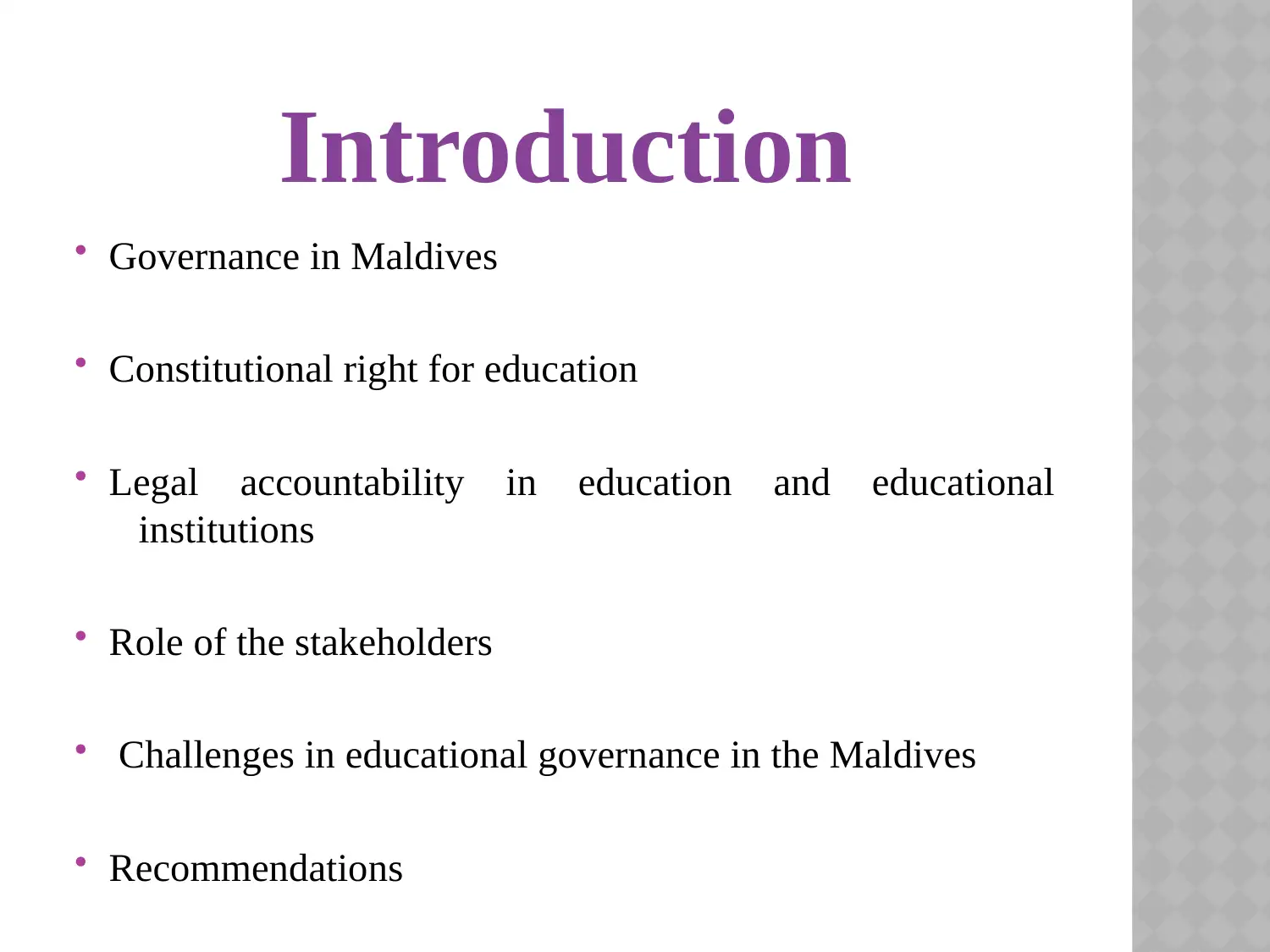
Introduction
Governance in Maldives
Constitutional right for education
Legal accountability in education and educational
institutions
Role of the stakeholders
Challenges in educational governance in the Maldives
Recommendations
Governance in Maldives
Constitutional right for education
Legal accountability in education and educational
institutions
Role of the stakeholders
Challenges in educational governance in the Maldives
Recommendations
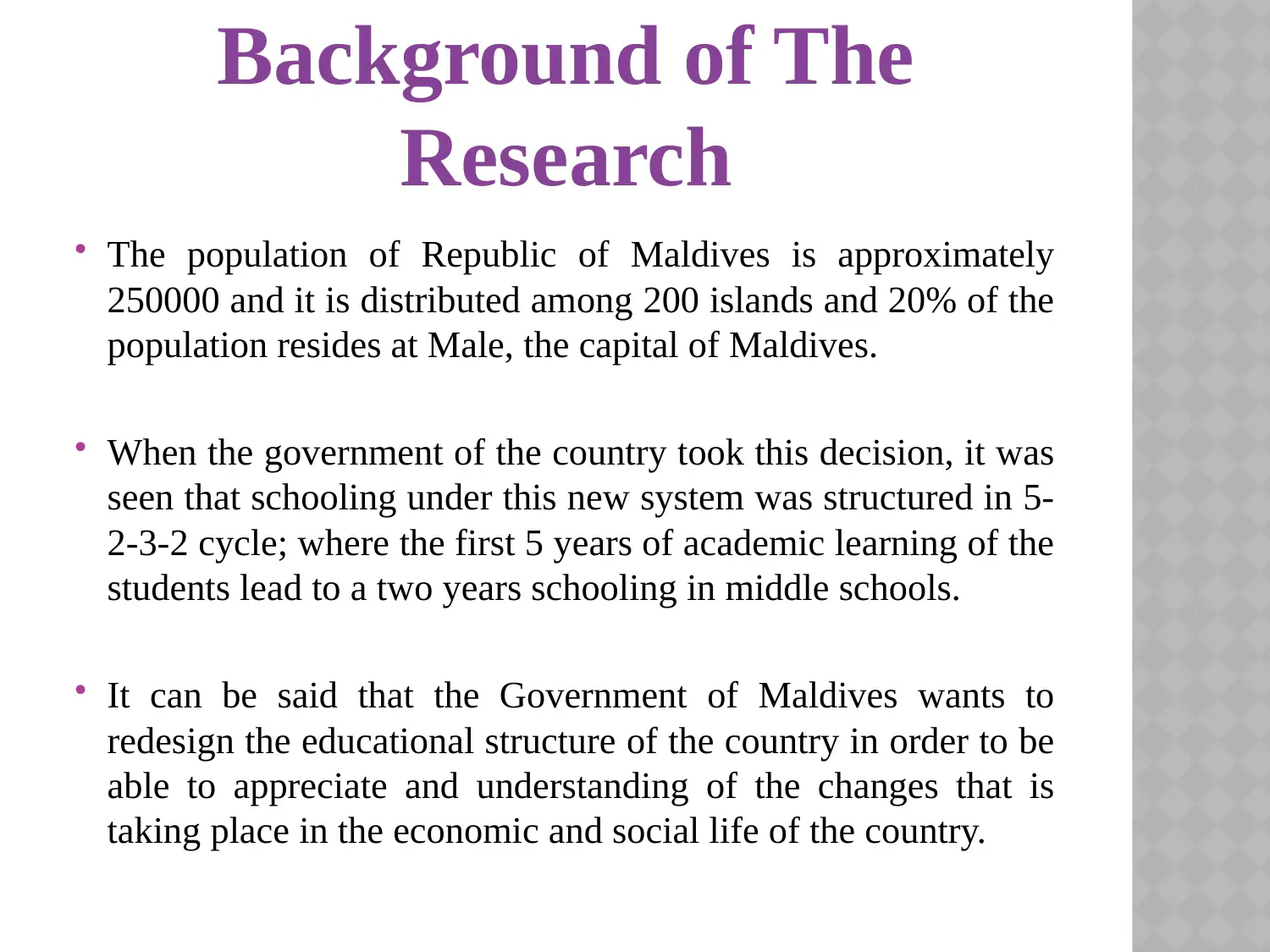
Background of The
Research
The population of Republic of Maldives is approximately
250000 and it is distributed among 200 islands and 20% of the
population resides at Male, the capital of Maldives.
When the government of the country took this decision, it was
seen that schooling under this new system was structured in 5-
2-3-2 cycle; where the first 5 years of academic learning of the
students lead to a two years schooling in middle schools.
It can be said that the Government of Maldives wants to
redesign the educational structure of the country in order to be
able to appreciate and understanding of the changes that is
taking place in the economic and social life of the country.
Research
The population of Republic of Maldives is approximately
250000 and it is distributed among 200 islands and 20% of the
population resides at Male, the capital of Maldives.
When the government of the country took this decision, it was
seen that schooling under this new system was structured in 5-
2-3-2 cycle; where the first 5 years of academic learning of the
students lead to a two years schooling in middle schools.
It can be said that the Government of Maldives wants to
redesign the educational structure of the country in order to be
able to appreciate and understanding of the changes that is
taking place in the economic and social life of the country.
⊘ This is a preview!⊘
Do you want full access?
Subscribe today to unlock all pages.

Trusted by 1+ million students worldwide
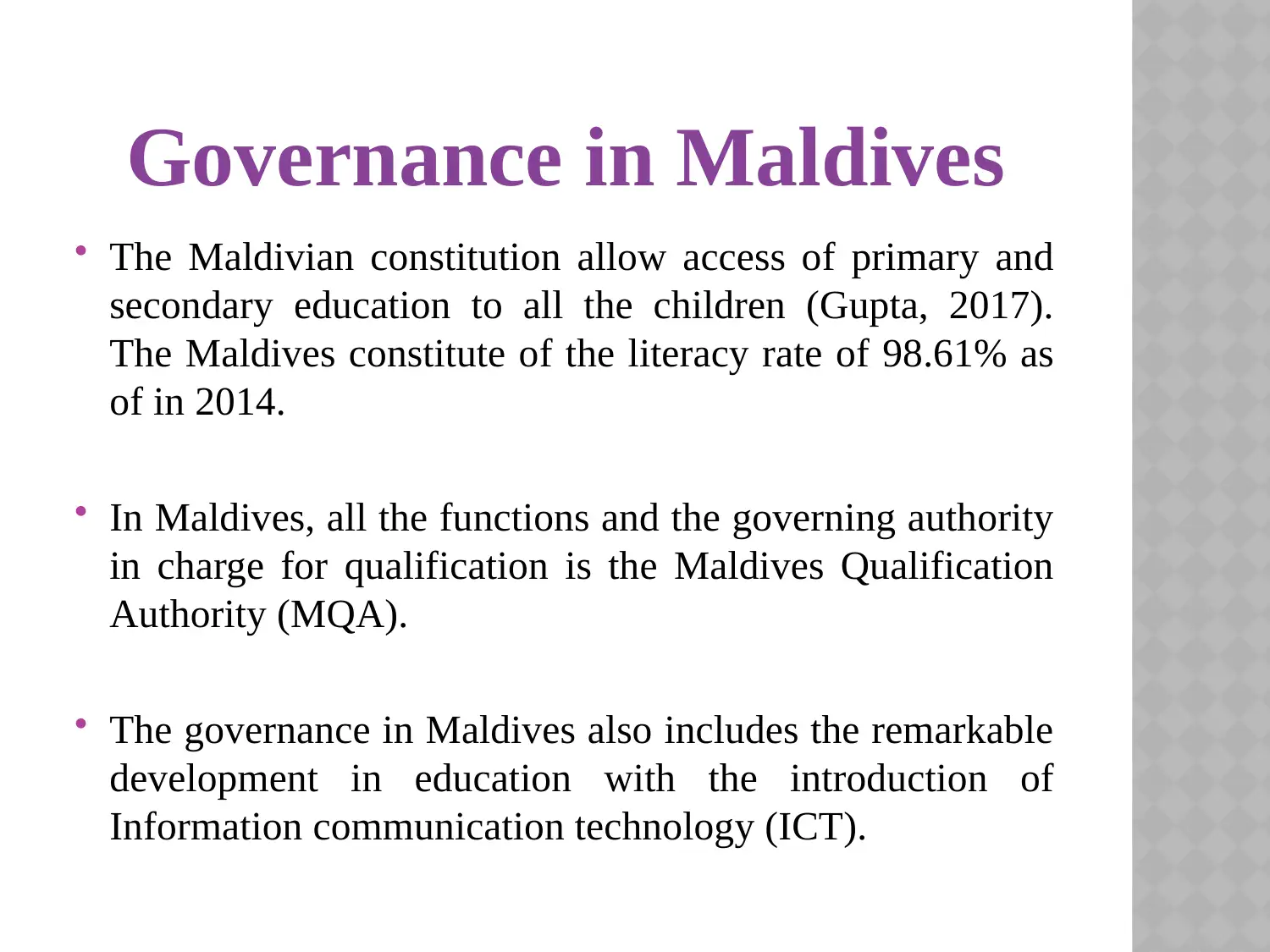
Governance in Maldives
The Maldivian constitution allow access of primary and
secondary education to all the children (Gupta, 2017).
The Maldives constitute of the literacy rate of 98.61% as
of in 2014.
In Maldives, all the functions and the governing authority
in charge for qualification is the Maldives Qualification
Authority (MQA).
The governance in Maldives also includes the remarkable
development in education with the introduction of
Information communication technology (ICT).
The Maldivian constitution allow access of primary and
secondary education to all the children (Gupta, 2017).
The Maldives constitute of the literacy rate of 98.61% as
of in 2014.
In Maldives, all the functions and the governing authority
in charge for qualification is the Maldives Qualification
Authority (MQA).
The governance in Maldives also includes the remarkable
development in education with the introduction of
Information communication technology (ICT).
Paraphrase This Document
Need a fresh take? Get an instant paraphrase of this document with our AI Paraphraser
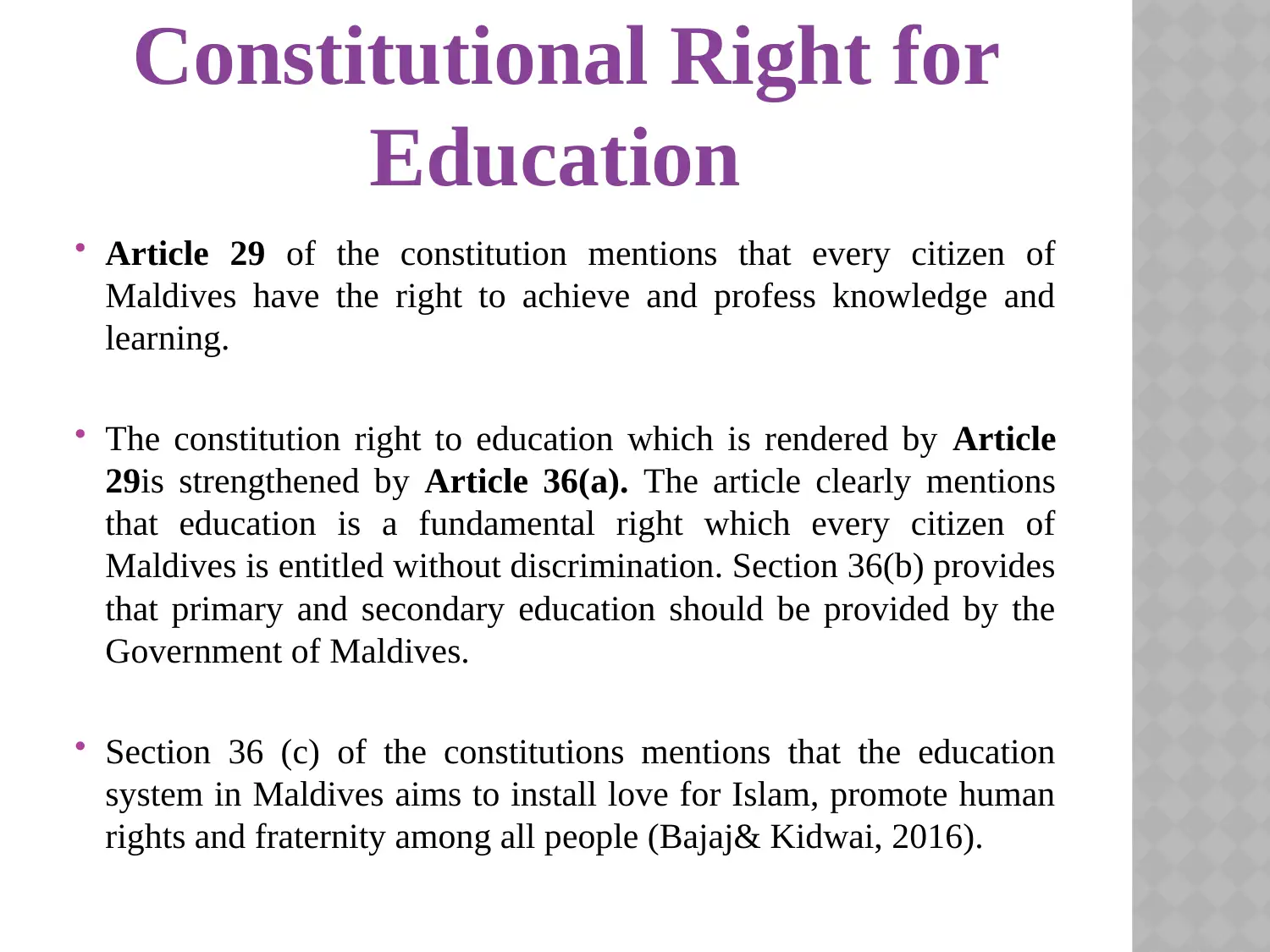
Constitutional Right for
Education
Article 29 of the constitution mentions that every citizen of
Maldives have the right to achieve and profess knowledge and
learning.
The constitution right to education which is rendered by Article
29is strengthened by Article 36(a). The article clearly mentions
that education is a fundamental right which every citizen of
Maldives is entitled without discrimination. Section 36(b) provides
that primary and secondary education should be provided by the
Government of Maldives.
Section 36 (c) of the constitutions mentions that the education
system in Maldives aims to install love for Islam, promote human
rights and fraternity among all people (Bajaj& Kidwai, 2016).
Education
Article 29 of the constitution mentions that every citizen of
Maldives have the right to achieve and profess knowledge and
learning.
The constitution right to education which is rendered by Article
29is strengthened by Article 36(a). The article clearly mentions
that education is a fundamental right which every citizen of
Maldives is entitled without discrimination. Section 36(b) provides
that primary and secondary education should be provided by the
Government of Maldives.
Section 36 (c) of the constitutions mentions that the education
system in Maldives aims to install love for Islam, promote human
rights and fraternity among all people (Bajaj& Kidwai, 2016).
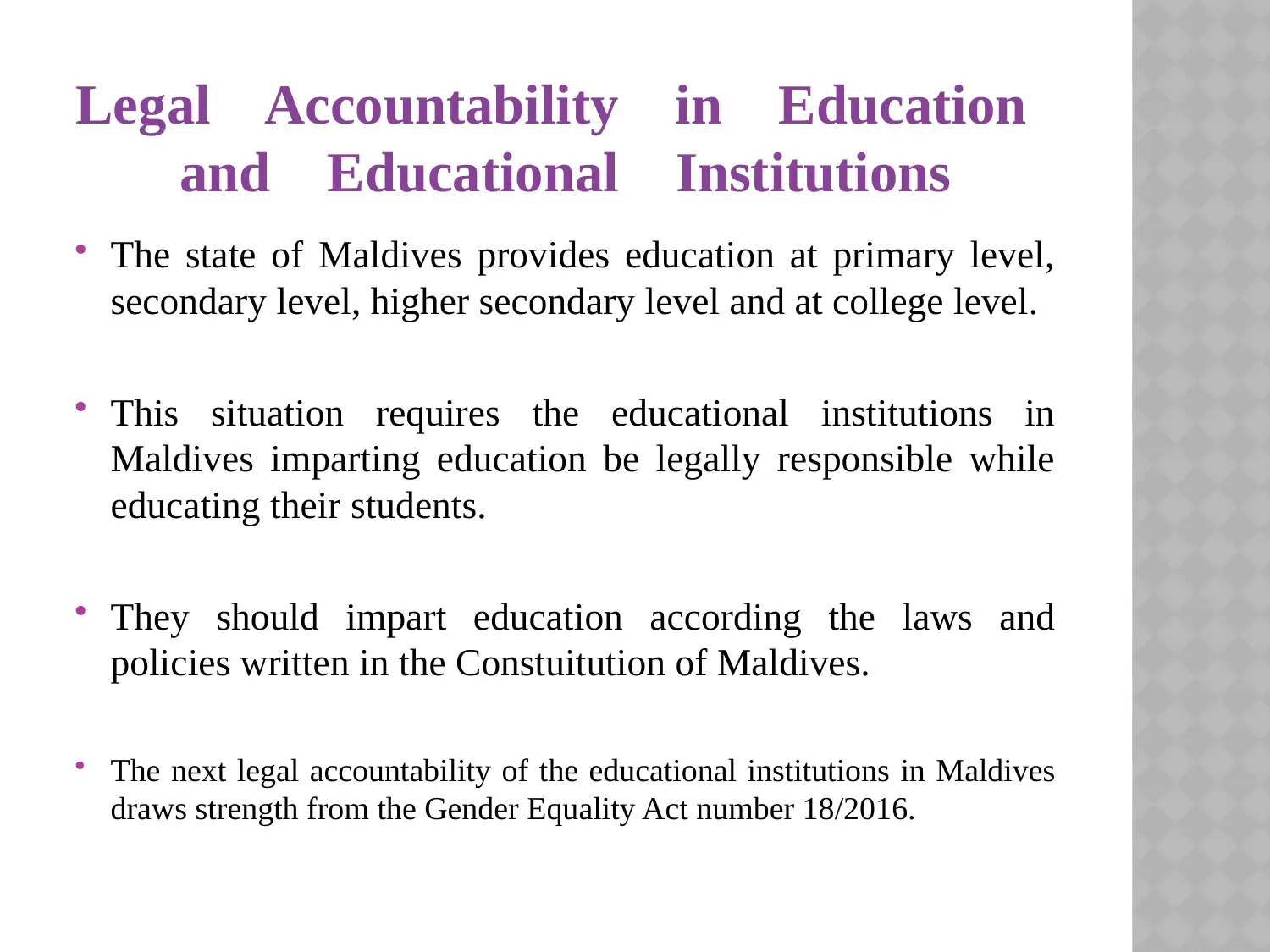
Legal Accountability in Education
and Educational Institutions
The state of Maldives provides education at primary level,
secondary level, higher secondary level and at college level.
This situation requires the educational institutions in
Maldives imparting education be legally responsible while
educating their students.
They should impart education according the laws and
policies written in the Constuitution of Maldives.
The next legal accountability of the educational institutions in Maldives
draws strength from the Gender Equality Act number 18/2016.
and Educational Institutions
The state of Maldives provides education at primary level,
secondary level, higher secondary level and at college level.
This situation requires the educational institutions in
Maldives imparting education be legally responsible while
educating their students.
They should impart education according the laws and
policies written in the Constuitution of Maldives.
The next legal accountability of the educational institutions in Maldives
draws strength from the Gender Equality Act number 18/2016.
⊘ This is a preview!⊘
Do you want full access?
Subscribe today to unlock all pages.

Trusted by 1+ million students worldwide
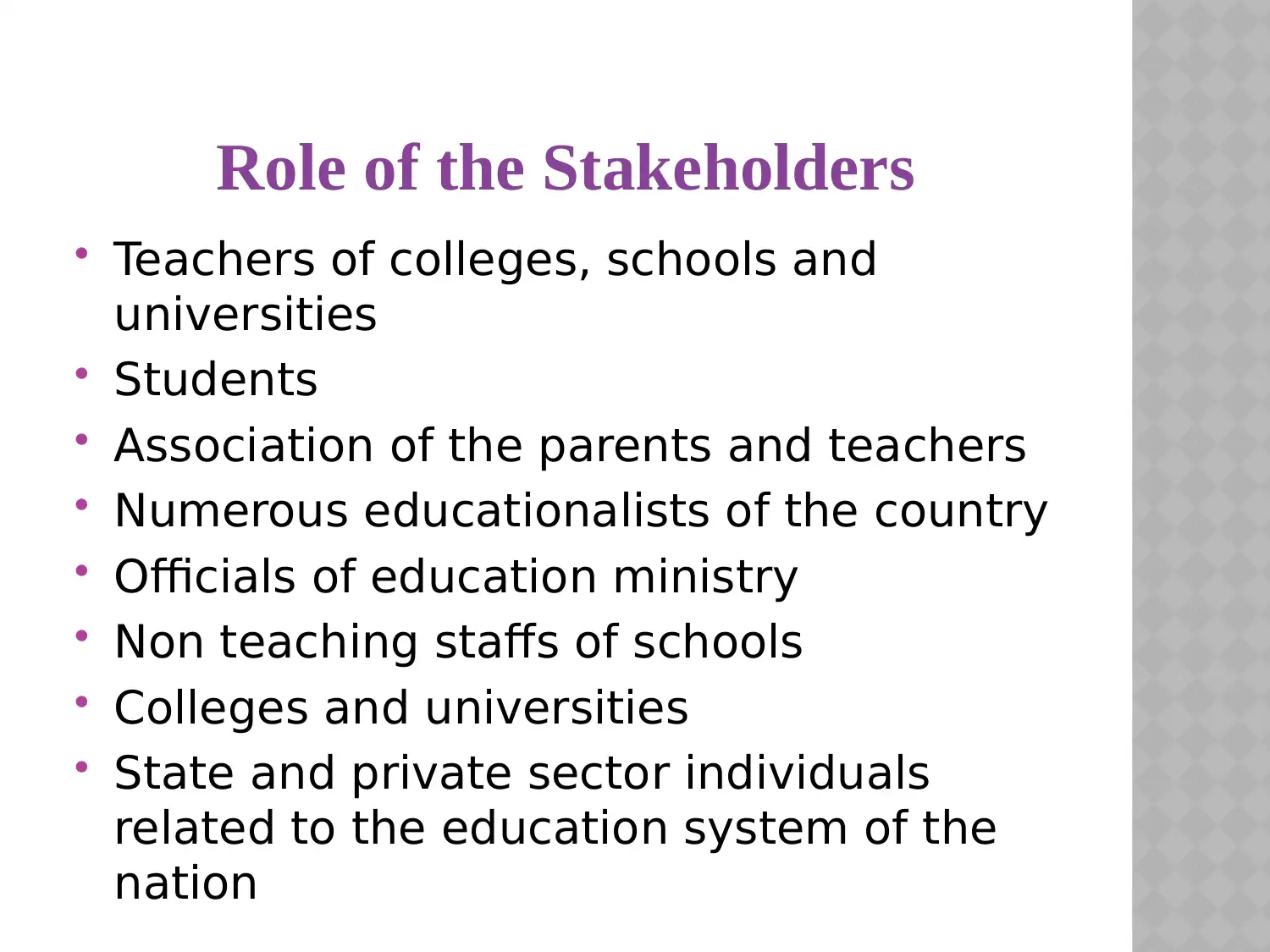
Role of the Stakeholders
Teachers of colleges, schools and
universities
Students
Association of the parents and teachers
Numerous educationalists of the country
Officials of education ministry
Non teaching staffs of schools
Colleges and universities
State and private sector individuals
related to the education system of the
nation
Teachers of colleges, schools and
universities
Students
Association of the parents and teachers
Numerous educationalists of the country
Officials of education ministry
Non teaching staffs of schools
Colleges and universities
State and private sector individuals
related to the education system of the
nation
Paraphrase This Document
Need a fresh take? Get an instant paraphrase of this document with our AI Paraphraser
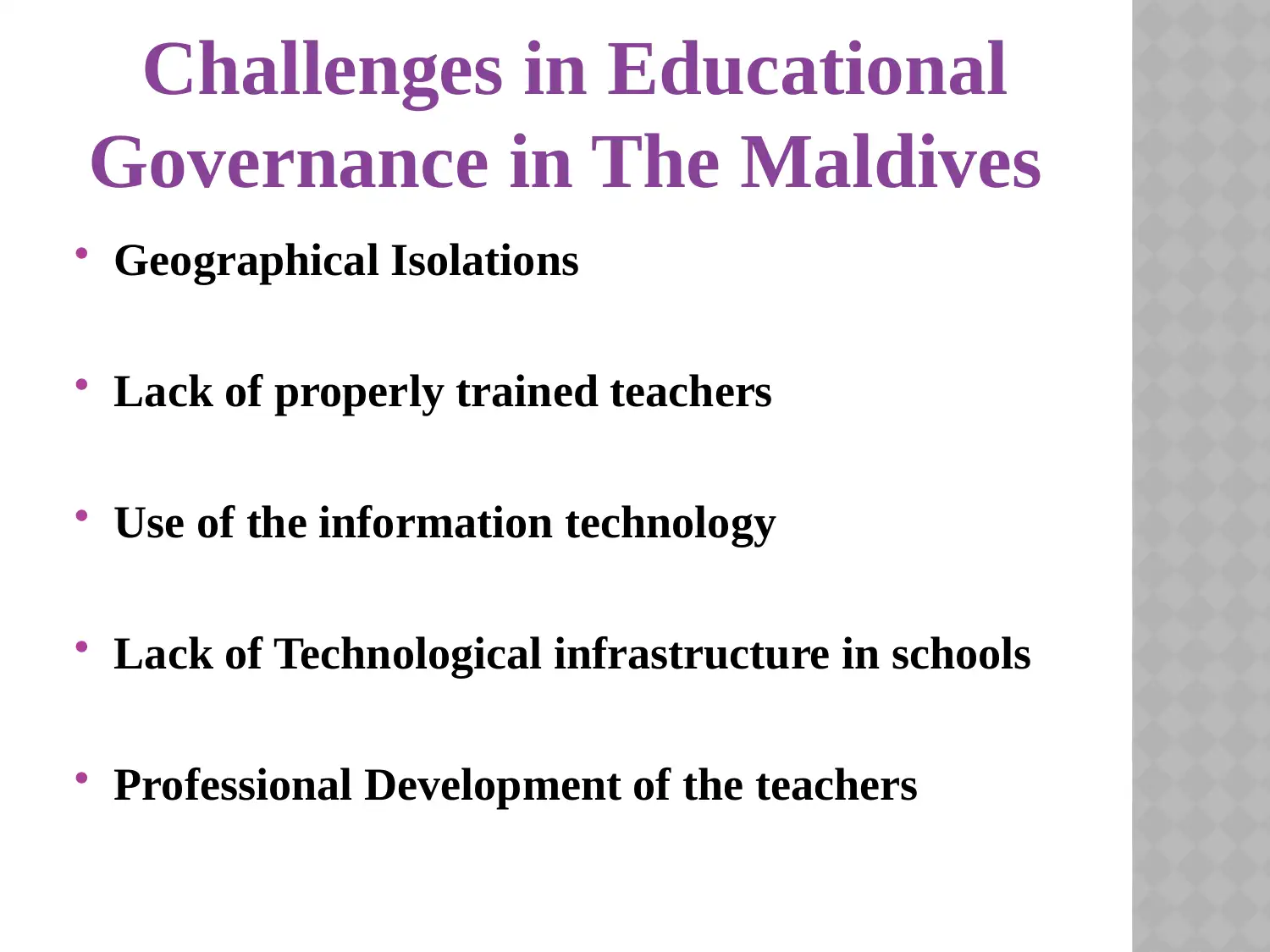
Challenges in Educational
Governance in The Maldives
Geographical Isolations
Lack of properly trained teachers
Use of the information technology
Lack of Technological infrastructure in schools
Professional Development of the teachers
Governance in The Maldives
Geographical Isolations
Lack of properly trained teachers
Use of the information technology
Lack of Technological infrastructure in schools
Professional Development of the teachers
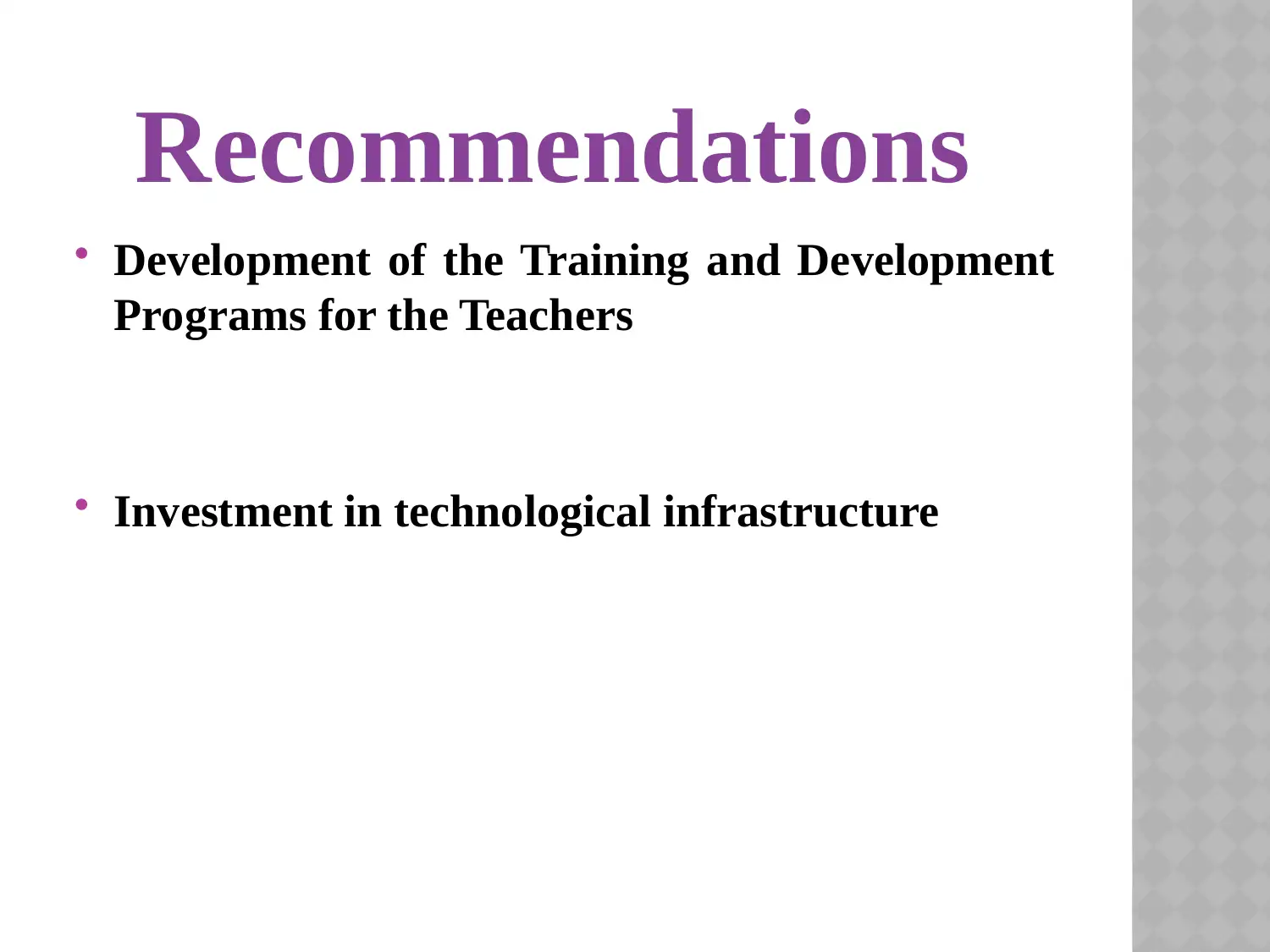
Recommendations
Development of the Training and Development
Programs for the Teachers
Investment in technological infrastructure
Development of the Training and Development
Programs for the Teachers
Investment in technological infrastructure
⊘ This is a preview!⊘
Do you want full access?
Subscribe today to unlock all pages.

Trusted by 1+ million students worldwide
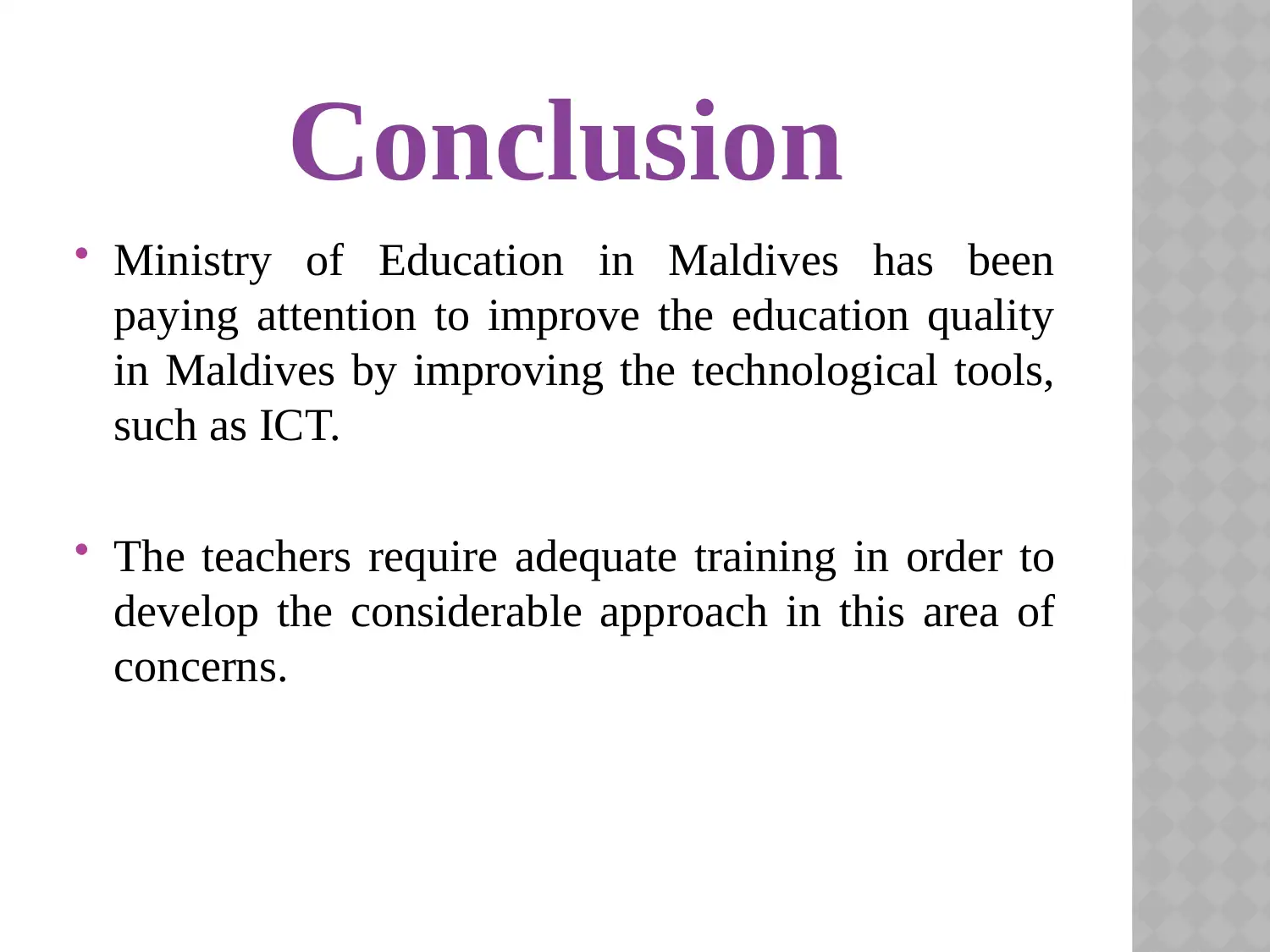
Conclusion
Ministry of Education in Maldives has been
paying attention to improve the education quality
in Maldives by improving the technological tools,
such as ICT.
The teachers require adequate training in order to
develop the considerable approach in this area of
concerns.
Ministry of Education in Maldives has been
paying attention to improve the education quality
in Maldives by improving the technological tools,
such as ICT.
The teachers require adequate training in order to
develop the considerable approach in this area of
concerns.
Paraphrase This Document
Need a fresh take? Get an instant paraphrase of this document with our AI Paraphraser
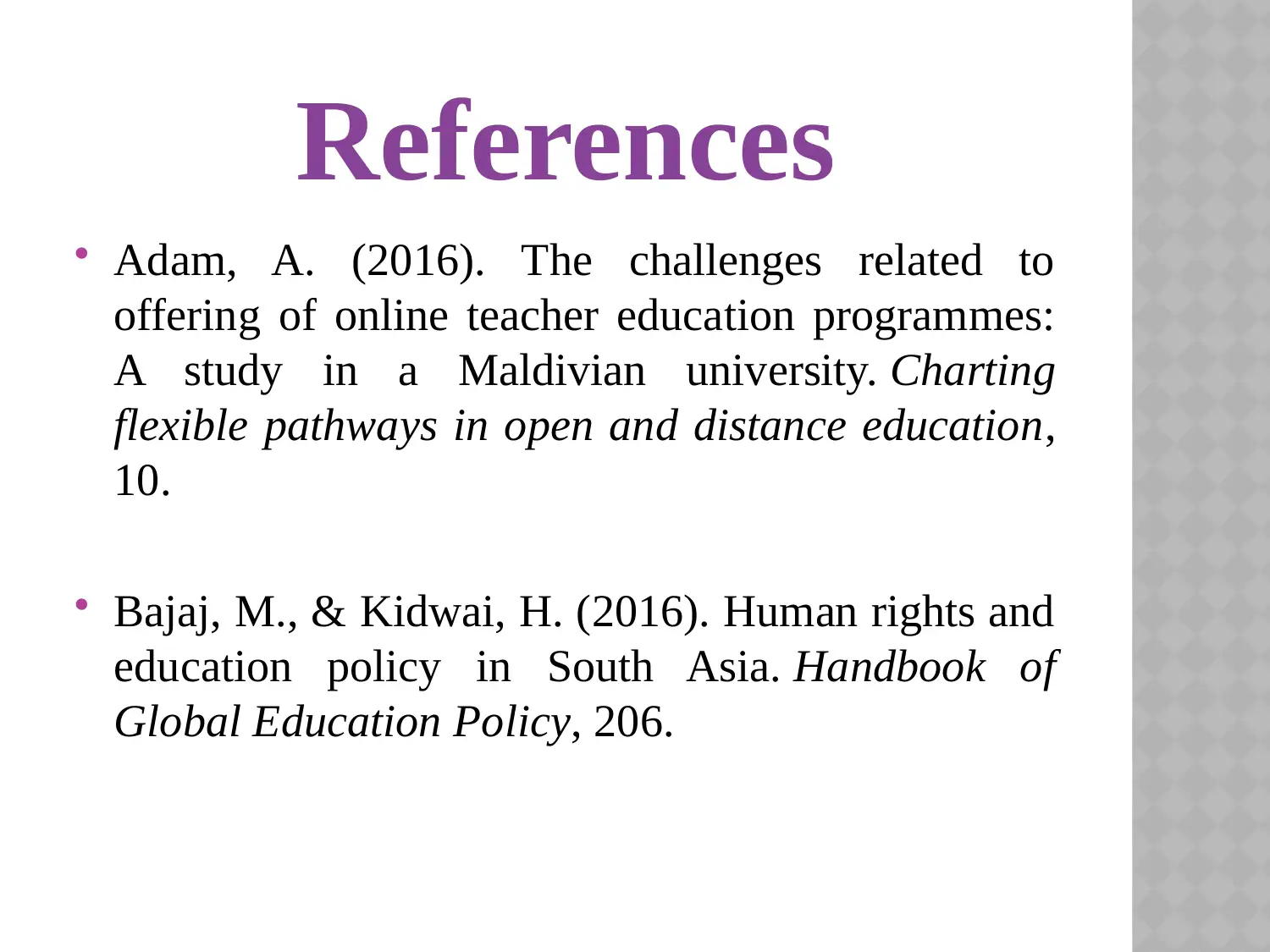
References
Adam, A. (2016). The challenges related to
offering of online teacher education programmes:
A study in a Maldivian university. Charting
flexible pathways in open and distance education,
10.
Bajaj, M., & Kidwai, H. (2016). Human rights and
education policy in South Asia. Handbook of
Global Education Policy, 206.
Adam, A. (2016). The challenges related to
offering of online teacher education programmes:
A study in a Maldivian university. Charting
flexible pathways in open and distance education,
10.
Bajaj, M., & Kidwai, H. (2016). Human rights and
education policy in South Asia. Handbook of
Global Education Policy, 206.

⊘ This is a preview!⊘
Do you want full access?
Subscribe today to unlock all pages.

Trusted by 1+ million students worldwide
1 out of 12
Related Documents
Your All-in-One AI-Powered Toolkit for Academic Success.
+13062052269
info@desklib.com
Available 24*7 on WhatsApp / Email
![[object Object]](/_next/static/media/star-bottom.7253800d.svg)
Unlock your academic potential
Copyright © 2020–2025 A2Z Services. All Rights Reserved. Developed and managed by ZUCOL.





